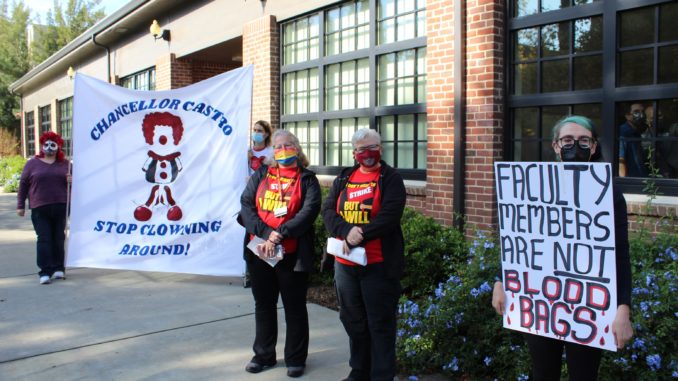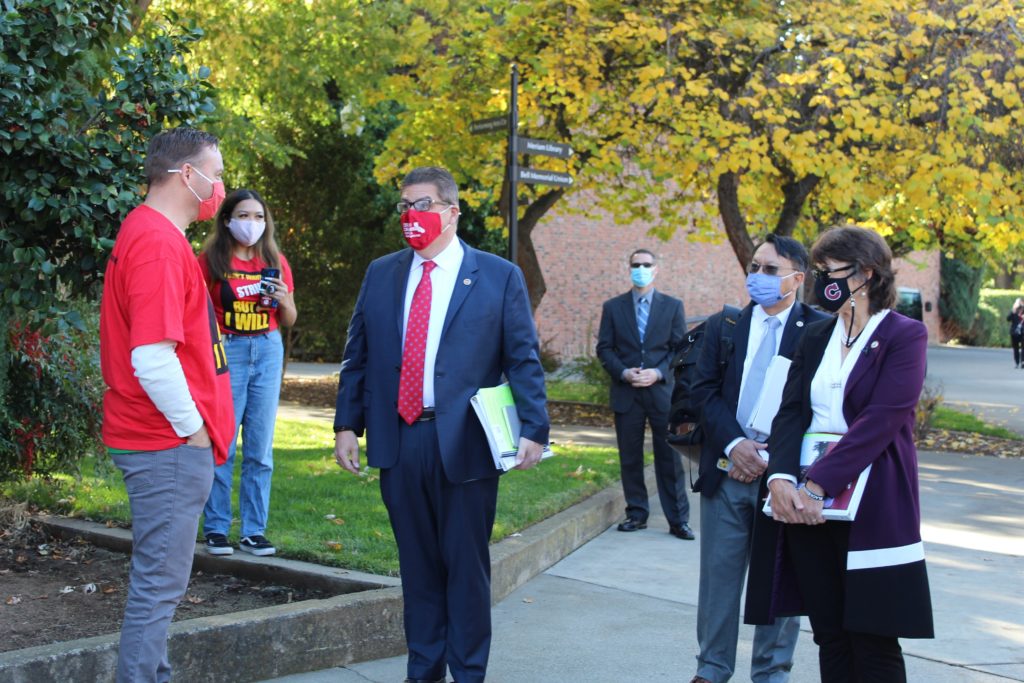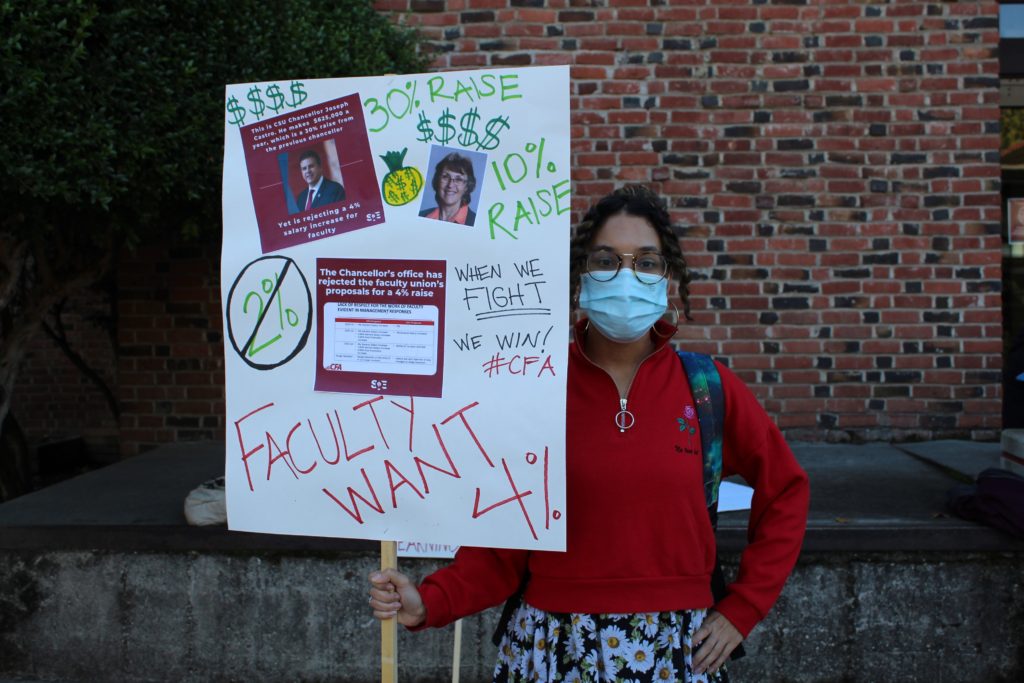
In addition to teaching full-time at Chico State, some faculty members say they are working another 25 to 30 hours a week after class and on weekends to make ends meet via side gigs like DoorDash or Lyft.
It’s why Aaron Draper, a lecturer and vice chairman of the lecturer’s council, has joined many of his fellow faculty members within the California Faculty Association to push for a 4 percent wage increase. He was among a large group that showed up at a campus open forum on Tuesday (Nov. 2) to advocate for the pay raise—as well as improved work conditions—and ask questions of visiting California State University Chancellor Joseph Castro.
Currently, the CSU system and CFA are at an impasse in contract negotiations, which have been ongoing for the past year and a half. The union—which includes 29,000 members across 23 campuses—is awaiting the start of mediation with the CSU.
During the forum, Draper noted that side jobs take away from lecturers’ abilities to focus on student education, and “it’s humiliating when you show up and deliver food to your students and they saw you in class the day before.”
Draper told the CN&R after the forum that his photography business accounts for almost half of his income, but he knows plenty of colleagues who do other gig jobs. “Most of us have second jobs or what we call a side hustle to make ends meet and pay our bills,” he said. “And that’s rough.”
Chico State faculty, staff and students used the rare occasion of having the chancellor’s ear to vent their frustrations about pay and call for action regarding numerous issues affecting the campus, including job security; a greater investment in student mental health care services and staffing; and prioritizing hiring and creating a more diverse faculty.
In response to Draper’s comments, Castro acknowledged that in order for faculty to put students first, they must “have a wage that is fair and enabling you to be successful in your life.”
“What you’ll be seeing are visible actions to try to address the inequities, and through our negotiation with the CFA, again, raising everybody up,” he said.
Castro told attendees that he has been working with university presidents to identify funds that they can use to increase compensation.
“It’s clear that we need to do more to support our employees,” Castro said. “I promise you that we’re going to be as fair as we possibly can.”

Mental health care was another key issue brought up by attendees. One student speaker noted that she and her peers experience long wait times for counseling services.
Castro responded that his office will be pursuing more state funding to expand mental health services, to which the student replied that it needs to happen soon because “students are struggling, and professors know that.”
President Gayle Hutchinson added that Chico State hired two counselors in 2019 and will bring on another counselor and two case workers, and that the center contracts with a 24-7 service. It was pointed out by attendees, however, that the university recently lost two of its counseling staff.
Lindsay Briggs, a tenured faculty member in the Department of Public Health & Health Services Administration and member of the CFA, has long advocated for increasing funding for the WellCat Counseling Center at Chico State. More mental health care services and staff are needed to meet the demand on campus, but the pandemic has made the situation more dire, she said.
“Counseling and wellness is a critical need right now,” she said. “Students cannot get in to counseling. The only ones who can get in are the ones most in crisis. … They can’t access services until they’re really not doing well or they’re suicidal.”
In terms of faculty pay, Briggs said the 4 percent ask isn’t even on par with the increase in inflation. Yet the CSU has countered the CFA’s proposal with an offer of 2 percent for this academic year. The pandemic has been taxing on educators, who have been offering online and hybrid courses and “doing all these things to keep students engaged,” as well as providing them with mental health support.
“We’ve been working really hard throughout this entire pandemic, and we aren’t even asking for inflation adjustments,” she said. “We go over and above our jobs all the time. and most of us are happy to do that. We wish there were more resources, because it’d be better for the students. We wish we got paid more, but at the end of the day, we’re always going to be there for our students and we just wish the administration would be there for us.”
Faculty hasn’t had a new contract since 2016. In recent years, they negotiated extensions that included two small pay increases, in the 2019-2020 and 2019-2020 academic years, of 3.5 percent and 2.5 percent, respectively.
Meanwhile, in September, the CSU Board of Trustees approved raises for CSU presidents of up to 10 percent under the rationale that it’s necessary to remain competitive with administrative pay at other institutions. (Hutchinson’s total pay and benefits for 2019 was $489,000, which includes$64,000 of “other pay” for things like housing and vehicle allowances.)

Speaking on the topic of minority representation, Ben Duarte, who works in the College of Engineering, said his department has had great success in recruiting bright students from poor, rural areas. But faculty who are BIPOC (Black, Indigenous, people of color) are “facing a battle where we’re getting more pressure to help” without being adequately supported or compensated, he told Castro.
While approximately 36 percent of the student body identifies as Hispanic/Latinx, only about 9 percent of employees identify the same, according to statistics from the university’s Employee and Student Diversity Dashboard for fall 2020.
As the student population becomes more ethnically diverses, Chico State is “not bringing in more BIPOC staff support or faculty,” Duarte said. That is harmful for student success, as BIPOC students do not have enough people they can comfortably turn to or relate to when looking for academic and personal support, he said.
Castro, the grandson of Mexican immigrants, was the first in his family to graduate from a university and is the first person of color to serve as CSU chancellor. He said that the support and retention of BIPOC faculty is an important issue across CSU campuses and that he would “do everything I can to encourage that, to find the funding for it” and create a culture that is conducive for all students to succeed, especially students of color who are the first in their family to attend college.
“I would love to see this campus open up to even more students of color,” he said. “There’s obviously more room to grow here, and I’m going to work with President Hutchinson to help support that growth over time.”
Hutchinson added that diversity, equity and inclusion are part of Chico State’s No. 1 strategic priority and acknowledged that the university needs to do better when it comes to recruiting and hiring BIPOC staff and faculty. Administration has revised job position descriptions and now conducts implicit bias training for job search committee members annually, she said, noting that the university has faced challenges with long-term BIPOC staff and faculty retiring or taking jobs elsewhere.
“I will say that we are working very hard in this area, and yes, we need to be doing better,” she said.
Briggs told the CN&R after the forum that she felt that the chancellor and administrators did not provide real answers and that faculty are “sick of being told to wait and see” when it comes to important changes.
“We’ve been doing that, and [they] have been failing,” she said. Now the CFA and CSU will enter mediation—and how that plays out will determine the CFA’s next action, including whether or not to consider a strike.

I think if you were to speak with people in the Student Health Center, you will find a few folks willing to speak on their plight.
One would think that seeing such high turnover in one department, that the folks who are supposed to be watching for abusive work areas would investigate.
I would dare to say, in the private sector, upper management would want to know why their talented employees were leaving in large numbers.
Private sector would start replacing management, or at least put a monitor to evaluate why there are problems.
Maybe instead of contracting with outside mental health professionals, they contract with Enloe to run the campus Student Health Center. They sure do have a bit of former Chico State employees working there who could properly identify problem areas.
How many Physicians does it take to run the Student Health Center? ONE?? TWO???
TWO is all that they have!!!
They must be real efficient to handle 13,500 students.
Someone give their management team a raise! Woo Hoo… we need more efficiency like that on campus.
Check for yourself:
https://apps.csuchico.edu/directory/Department/WCHC
I wonder … is anyone paying attention? Does anyone care? I feel sorry for those who hate their job and just waiting to hear back from Enloe or Oroville or wherever they are applying to.
I hope they find better peace and happiness. These folks deserve better!